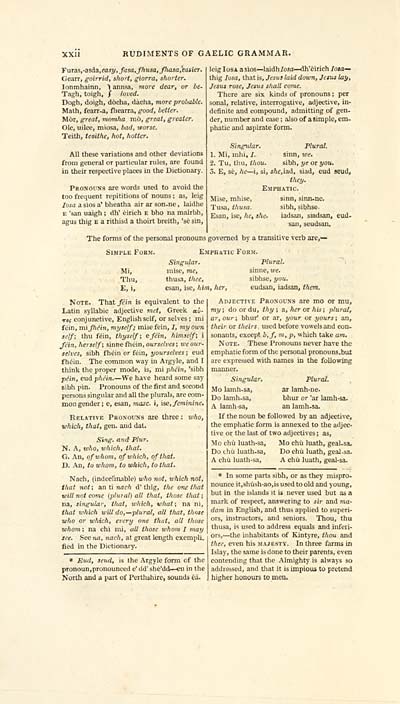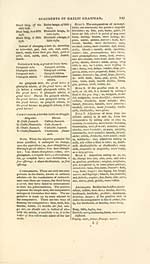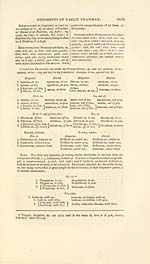Download files
Complete book:
Individual page:
Thumbnail gallery: Grid view | List view

xxu
RUDIMENTS OF GAELIC GRAMMAR.
T\iT!L%,-asdii,east/,fasa,fhusa,f?iasa 'easier.
Gearr, goirrid, short, giorra, shorter.
lonmhainn, >annsa, more dear, or be-
Tagh, toigh, / loved.
Dogh, doigh, dòcha, dacha, more probable.
Math, fearr-a, fliearra, good, better.
Mòr, great, viomha mo, great, greater.
Olc, uilce, miosa, bad, xeorse.
Teith, teoithe, hot, hotter.
All these variations and other deviations
from general or particular rules, are found
in their respective places in the Dictionary.
Pronouns are words used to avoid the
too frequent repititions of nouns ; as, leig
losa a sios a' bheatha air ar son.ne , laidhe
E 'san uaigh ; dh' èirich e bho na mairbh,
agus thig E a rithisd a tlioirt breith, 'sè sin.
leig losA asios— laidh/oio — dh'èirich Iota—
thig losa, that is, Jesus laid down, Jems lay,
Jesus rose, Jesus shall come.
There are six kinds of pronouns ; per
sonal, relative, interrogative, adjective, in-
definite and compound, admitting of gen-
der, number and case ; also of a Simple, em-
phatic and aspirate form.
Sing7ilar. Plural.
1. Mi, mhi, /. Sinn, we.
2. Tu, thu, thou. sibh, ye or you.
3. E, sè, he—i, si, she,iad, siad, eud seud,
they.
Emphatic.
Mise, mhise, sinn, sinn-ne.
Tusa, thusa. sibh, sibhse,
Esan, ise, he, she. iadsan, siadsan, eud-
san, seudsan.
The forms of the personal pronouns governed by a transitive verb are,—
Simple Form. E-mphatic Form.
Singular. Plural.
Note. That fi!in is equivalent to the
Latin syllabic adjective met, Greek au-
ras conjunctive, English self, or selves ; mi
f(5in, mifhèin, myself; mise fein, /, my own
self; thu fein, thyself; efiin, himself; i
fein, herself; sinnefhum, ourselves; we our-
selves, sibh fhòin or fein, yourselves ; eud
ihèin. The common way in Argyle, and I
think the proper mode, is, mi pht'in, 'sibh
pHn, eud p/u'in.—We have heard some say
sibh pin. Pronouns of the first and second
persons singular and all the plurals, are com-
mon gender; e, esan, ^nasc. i, ise, feminine.
Relative Pronouns are three: who,
which, that, gen. and dat.
Sing, and Plur.
N. A, who, which, that.
G. An, of whom, of which, of that.
D. An, to whom, to which, to that.
Nach, (indeclinable) who not, which not,
that Wit ; an ti mich d' thig, the one that
will not come {plural) all that, those that;
na, singular, that, which, what; na ni,
that which will do,— plural, all that, those
who or which, every one that, all those
whom; na chi ini, ali those whom I tnay
see. See lui, nach, at great length exempli,
fied in the Dictionary.
* Eud, seud, is the Argyle form of the
pronoun,pronounccd e' tld' she'dd— eu in tlie
North and a part of Perthshire, sounds ea.
Adjective Pronouns are mo or mu,
my ; do or du, thy ; a, her or his; plural,
ar, our ; bhur* or ar, your or yours ; an,
their or theirs used before vowels and con-
sonants, except b,f, m, p, which take am.
Note. These Pronouns never have the
emphatic form of the personal pronouns.but
are expressed with names in the following
manner.
Singular. Plural.
Mo lamh-sa, ar lamh-ne.
Do lamh-sa, bhur or 'ar lamh-sa.
A lamh-sa, an lamh-sa.
If the noun be followed by an adjective,
the emphatic form is annexed to the adjec-
tive or the last of two adjectives; as,
Mc chii luath-sa. Mo chii luath, geal-sa.
Do thu luath-sa. Do chii luath, geal-sa.
A chii luath-sa, A chii luath, geal-sa.
n some parts sibh, or as they mispro.
it,shùsh-ao,is used to old and young,
but in the islands it is never used but as a
mark of respect, answering to sir and ma-
dam in English, and thus applied to superi-
ors, instructors, and seniors. Thou, thu
thusa, is used to address equals and inferi-
ors,' — the inhabitants of Kintyre, thoii and
thee, even his majesty. In three farms in
Islay, the same is done to their parents, even
contending that the Almighty is always so
addressed, and that it is impious to pretend
higher honours to men.
RUDIMENTS OF GAELIC GRAMMAR.
T\iT!L%,-asdii,east/,fasa,fhusa,f?iasa 'easier.
Gearr, goirrid, short, giorra, shorter.
lonmhainn, >annsa, more dear, or be-
Tagh, toigh, / loved.
Dogh, doigh, dòcha, dacha, more probable.
Math, fearr-a, fliearra, good, better.
Mòr, great, viomha mo, great, greater.
Olc, uilce, miosa, bad, xeorse.
Teith, teoithe, hot, hotter.
All these variations and other deviations
from general or particular rules, are found
in their respective places in the Dictionary.
Pronouns are words used to avoid the
too frequent repititions of nouns ; as, leig
losa a sios a' bheatha air ar son.ne , laidhe
E 'san uaigh ; dh' èirich e bho na mairbh,
agus thig E a rithisd a tlioirt breith, 'sè sin.
leig losA asios— laidh/oio — dh'èirich Iota—
thig losa, that is, Jesus laid down, Jems lay,
Jesus rose, Jesus shall come.
There are six kinds of pronouns ; per
sonal, relative, interrogative, adjective, in-
definite and compound, admitting of gen-
der, number and case ; also of a Simple, em-
phatic and aspirate form.
Sing7ilar. Plural.
1. Mi, mhi, /. Sinn, we.
2. Tu, thu, thou. sibh, ye or you.
3. E, sè, he—i, si, she,iad, siad, eud seud,
they.
Emphatic.
Mise, mhise, sinn, sinn-ne.
Tusa, thusa. sibh, sibhse,
Esan, ise, he, she. iadsan, siadsan, eud-
san, seudsan.
The forms of the personal pronouns governed by a transitive verb are,—
Simple Form. E-mphatic Form.
Singular. Plural.
Note. That fi!in is equivalent to the
Latin syllabic adjective met, Greek au-
ras conjunctive, English self, or selves ; mi
f(5in, mifhèin, myself; mise fein, /, my own
self; thu fein, thyself; efiin, himself; i
fein, herself; sinnefhum, ourselves; we our-
selves, sibh fhòin or fein, yourselves ; eud
ihèin. The common way in Argyle, and I
think the proper mode, is, mi pht'in, 'sibh
pHn, eud p/u'in.—We have heard some say
sibh pin. Pronouns of the first and second
persons singular and all the plurals, are com-
mon gender; e, esan, ^nasc. i, ise, feminine.
Relative Pronouns are three: who,
which, that, gen. and dat.
Sing, and Plur.
N. A, who, which, that.
G. An, of whom, of which, of that.
D. An, to whom, to which, to that.
Nach, (indeclinable) who not, which not,
that Wit ; an ti mich d' thig, the one that
will not come {plural) all that, those that;
na, singular, that, which, what; na ni,
that which will do,— plural, all that, those
who or which, every one that, all those
whom; na chi ini, ali those whom I tnay
see. See lui, nach, at great length exempli,
fied in the Dictionary.
* Eud, seud, is the Argyle form of the
pronoun,pronounccd e' tld' she'dd— eu in tlie
North and a part of Perthshire, sounds ea.
Adjective Pronouns are mo or mu,
my ; do or du, thy ; a, her or his; plural,
ar, our ; bhur* or ar, your or yours ; an,
their or theirs used before vowels and con-
sonants, except b,f, m, p, which take am.
Note. These Pronouns never have the
emphatic form of the personal pronouns.but
are expressed with names in the following
manner.
Singular. Plural.
Mo lamh-sa, ar lamh-ne.
Do lamh-sa, bhur or 'ar lamh-sa.
A lamh-sa, an lamh-sa.
If the noun be followed by an adjective,
the emphatic form is annexed to the adjec-
tive or the last of two adjectives; as,
Mc chii luath-sa. Mo chii luath, geal-sa.
Do thu luath-sa. Do chii luath, geal-sa.
A chii luath-sa, A chii luath, geal-sa.
n some parts sibh, or as they mispro.
it,shùsh-ao,is used to old and young,
but in the islands it is never used but as a
mark of respect, answering to sir and ma-
dam in English, and thus applied to superi-
ors, instructors, and seniors. Thou, thu
thusa, is used to address equals and inferi-
ors,' — the inhabitants of Kintyre, thoii and
thee, even his majesty. In three farms in
Islay, the same is done to their parents, even
contending that the Almighty is always so
addressed, and that it is impious to pretend
higher honours to men.
Set display mode to: Large image | Transcription
Images and transcriptions on this page, including medium image downloads, may be used under the Creative Commons Attribution 4.0 International Licence unless otherwise stated. ![]()
| Early Gaelic Book Collections > Blair Collection > Argyleshire pronouncing Gaelic dictionary > (26) |
|---|
| Permanent URL | https://digital.nls.uk/76240192 |
|---|
| Description | A selection of books from a collection of more than 500 titles, mostly on religious and literary topics. Also includes some material dealing with other Celtic languages and societies. Collection created towards the end of the 19th century by Lady Evelyn Stewart Murray. |
|---|
| Description | Selected items from five 'Special and Named Printed Collections'. Includes books in Gaelic and other Celtic languages, works about the Gaels, their languages, literature, culture and history. |
|---|

